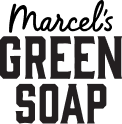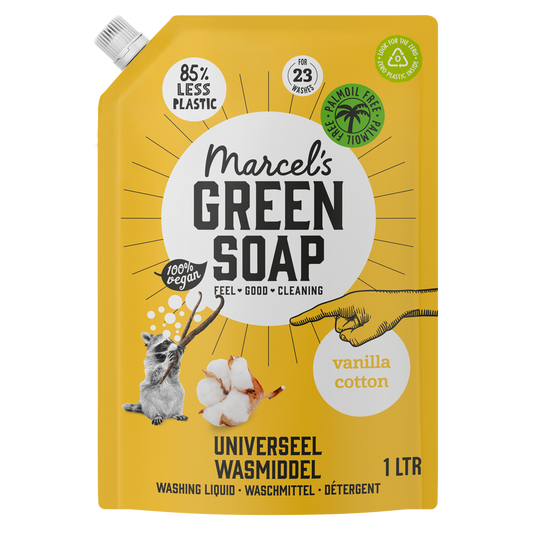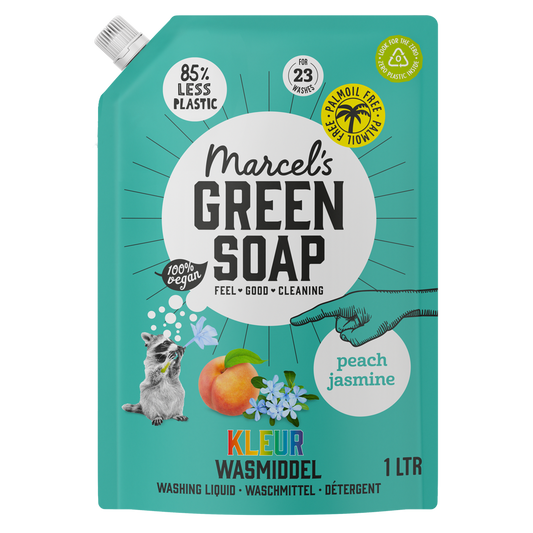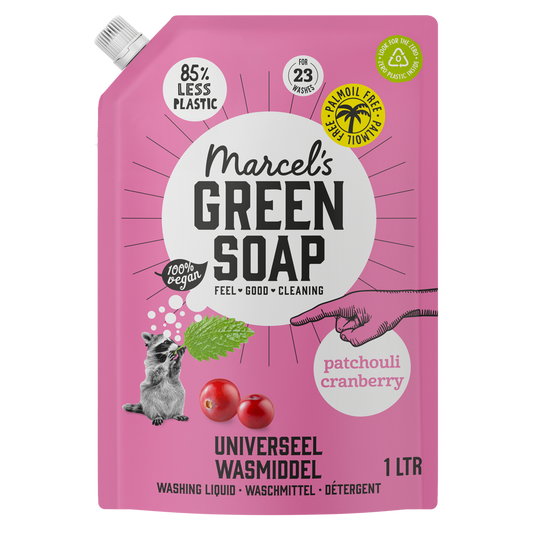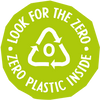After several months of intensive testing and development, Marcel is proud to introduce the first palm oil-free liquid laundry detergent in the Netherlands! And we're quite proud of it. Curious why our laundry detergent is now palm oil-free? In this article, you'll find out everything about it.
FEEL GOOD CLEANING
Marcel has always been transparent about what our brand stands for, the ingredients we use, and where our products are produced. His vision was, and still is, to change the world of soap. Marcel's kitchen cabinet was full of aggressive, chemical products that didn't exactly make the world cleaner. That had to change: a clean house and a healthy planet. He focused on developing ecological soap. That was the beginning of a line of vegan and almost completely biodegradable products for your entire home and even for the shower. Ecological soaps in bottles made of 100% recycled plastic, good for you and for the planet. We call it Feel Good Cleaning. But we've been feeling less good about using palm oil in our products.We've all seen the images of rainforests being cleared to make way for palm oil plantations. We find that regrettable. The rainforest is responsible for more than 80% of the Earth's biodiversity. Rainforests, like those in the Amazon region, also play an important role in absorbing CO2. The vegetation on our planet, of which the Amazon is an important part, absorbs a quarter of all the CO2 we emit. There's also a lot of CO2 stored in the forests, including in trees and charcoal. When that's released, it has a big impact. That's why it's so important to protect the rainforests that still exist.
That got Marcel thinking. If this continues, the Earth will continue to warm. Will the Earth still be livable for his three daughters in a few years? There must be another way to deal with ingredients like palm oil.
SLOWING THE GROWTH OF NEW PALM OIL PLANTATIONS
The world's population is growing, and the demand for palm oil will only increase. The only solution to slow the growth of new palm oil plantations is to use less palm oil. That's why Marcel decided to make his laundry detergent, the product we all (almost) use daily, palm oil-free. With this product, we can make the most impact together. Additionally, laundry detergent is also the product where you notice less if palm oil is left out. How so? Let us explain. The surfactants (the foaming and dirt-dissolving agents) in some of our products are made from palm oil. Palm oil is a wonderful product and works very well, you don't need much of it, and it's a relatively cheap ingredient. That's also why the world loves palm oil: it's very difficult to create a formulation that works just as well, feels just as nice, and is just as affordable.After much testing and experimenting, we succeeded with our laundry detergent. With laundry detergent, you have the advantage that in addition to surfactants, there are also enzymes that dissolve dirt (they take over some of the work of the surfactants). Also, you don't touch laundry detergent with your hands, so you don't feel the difference. This applies to all other products like shampoo, so it's much harder to get an equivalent product without palm oil. Moreover, replacing palm oil in all products is not the solution.
WHY COMPLETELY REJECTING PALM OIL ISN'T THE SOLUTION
We believe that completely rejecting all palm oil is not the answer. No other vegetable oil scores better on these environmental aspects than palm oil. Palm oil has a very high yield per hectare (4-10 times higher than other vegetable oils), and it requires few pesticides and fertilizers for cultivation. Also, little irrigation is needed for palm oil. In many products, coconut oil or a mixture of soybean oil, rapeseed oil, and sunflower oil could replace palm oil. But coconut oil and soybean oil are also tropical products. They have a lower yield per hectare than palm oil, making the risk of deforestation (and thus loss of biodiversity and extra emission of greenhouse gases due to land conversion) even greater than with palm oil. Fully replacing palm oil with coconut oil or soybean oil is therefore not more environmentally friendly.
BUT WHAT THEN?
We believe it's important as a brand to do our part and focus on slowing the growth of new palm oil plantations. Together, we can ensure that rainforests no longer have to make way for new palm oil plantations. There are enough palm oil plantations on our planet; we don't need more. Let's explore other routes together and find new ways to deal with palm oil. To be more conscious about palm oil. For example, choose products without palm oil where it's easy, and opt for sustainable palm oil when it's difficult to replace palm oil.
WHAT IS SUSTAINABLE PALM OIL?
All our suppliers of palm and coconut oil ingredients are certified sustainable palm oil suppliers by the Roundtable on Sustainable Palm Oil (RSPO). The RSPO is an international organization where companies and environmental organizations (including WWF and Oxfam Novib) work together to make palm oil cultivation worldwide more sustainable. Palm oil with the RSPO label must meet a lot of requirements. For example, the cultivation of sustainable palm oil must not have come at the expense of natural forests and the habitat of endangered species. Plantations on peatland are also not allowed. There are also requirements for the use of pesticides, wastewater management, energy, and greenhouse gases. The label also has criteria for respecting the rights of workers and local residents.By being more conscious about palm oil together, we can make a difference. Are you in?
Try our palm oil-free laundry detergent now and really get your laundry clean. Oh, and don't forget to share your palm oil-free laundry moment with us using the hashtag #trulyclean, we'd love that.
Sources: Milieu Centraal, World Animal Protection, WWF, RSPO, NOS

